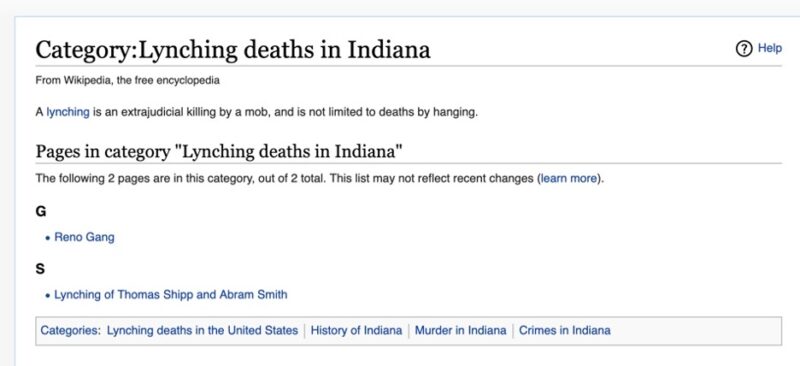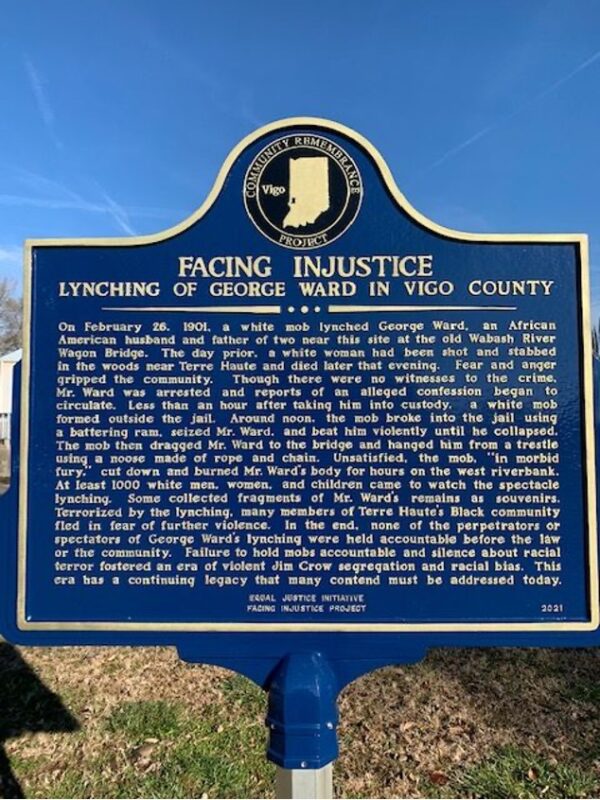Practicing public history on Wikipedia
04 August 2022 – Madeline Hellmich
NCPH 2022 awards, digital media, advocacy, social justice, public engagement, community history, collaboration, race
Editor’s Note: This post is part of a series of reflections from winners of NCPH awards in 2022. Madeline Hellmich is the winner of a graduate student travel award.
The online encyclopedia Wikipedia, which launched in 2001, is the seventh-most visited website in the world. While Wikipedia has arguably become the universal place to go for information about any subject, historians have a long and complicated relationship with it. Still, because no space exists between historians and the public on Wikipedia, the forum provides us with an opportunity to debate, collaborate, and ultimately practice historical truth-telling with the public.
In one of the earliest critiques of Wikipedia by a historian, Roy Rosenzweig observed in 2006 that basic American history topics such as women’s suffrage and the Harlem Renaissance did not appear in an article about the United States from 1918 to 1945. Wikipedia reflects the systemic inequalities that pervade society due in part to the implicit or explicit gender and racial biases in editors’ contributions. Wikipedia has pages and surveys dedicated to discussing these problems—like the fact that most Wikipedia editors are typically technologically-inclined, English-speaking, and highly educated men and fewer than 19 percent of the 1.5 million English-version Wikipedia biographies are about women.
Grassroots public history groups such as Black Lunch Table, Whose Knowledge?, and AfroCROWD recognize the silencing of historically excluded peoples on Wikipedia and have chosen to utilize Wikipedia to challenge these silences. Accordingly, public historians who seek to engage the public in the work of combating social injustices can and should practice good public history on Wikipedia.

Wikipedia Category page for “Lynching deaths in Indiana” circa 2016. Photo credit: Jere Odell, Scholarly Communication Librarian.
I started my coursework as an IUPUI public history graduate student in 2020 as many Americans rose in protest after the murder of George Floyd. At IUPUI, I began studying the history of anti-Black violence in my home state of Indiana and learned that Wikipedia was largely silent on Indiana’s history of anti-Black violence. Faculty and other graduate students in public history at IUPUI are currently working to increase the visibility of the state’s history of racist violence on the site. I decided Wikipedia was a good place to help contribute to a public record that shows that racial violence and terrorism have been embedded in Indiana since its founding.
Since my colleagues and I started adding articles about instances of anti-Black violence in Indiana to Wikipedia, we have met successes and challenges. For example, over 16,000 people visited the “Lynching of George Ward” page we added in its first 30 days. It is incredible that thousands of people are learning about George Ward, the white Hoosiers who lynched him in 1901, and the recent grassroots efforts to memorialize Ward’s life and acknowledge the lynching. However, after the “Lynching of George Ward” page went public, another editor, unaffiliated with our group, made a poorly sourced addition to the page that suggested Ward was guilty of the alleged crime for which the lynch mob murdered him; the addition also centered the white victim whom Ward was accused of killing rather than the story of Ward’s life and death.
Wikipedia’s model is founded on the idea that anyone can edit its pages, but these edits by the unknown editor made me feel angry and frustrated. I questioned if Wikipedia was the right place to practice public history about anti-Black violence. We did everything we could to share Ward’s story using a victim-centered approach that highlighted his personhood and decentered the white perpetrators of the murder. So, how could we respond?

Descendants of George Ward, the Facing Injustice Project, the Greater Terre Haute NAACP Branch, and the Equal Justice Initiative unveiled this marker in memory of Ward at a ceremony in Fairbanks Park in Terre Haute, Indiana, on September 26, 2021. Click here for a transcript of the marker. Photo credit: Madeline Hellmich.
There are standard Wikipedia strategies my colleagues and I are learning to apply now. In the Talk page, a page associated with every Wikipedia article where editors discuss how to improve the page, we argued that the editor introduced erroneous information from an unreliable source and thus should remove that information. The editor replied that the source came from an academic publisher. We responded that the source’s author provided no citations and that we would reach out to the publisher to see if they could substantiate the author’s claims.
We also tried another strategy: adding an alternative perspective. Inserting context about the larger scope of lynchings of Black men in Indiana’s history allowed us to show that the white mob’s actions were consistent with a pattern of racist violence in the state rather than an anomaly.
We could have removed the information the other editor added without commenting, but this could have sparked an editing war, which could get our editing privileges revoked. If the editor decides to leave the information, we could follow dispute resolution steps to bring uninvolved Wikipedia editors into the conversation and reach a consensus. Finally, we could seek a third opinion from one volunteer, post the debate on the reliable sources noticeboard, or request for comment to get community-wide input. During this process, a Wikipedia administrator could weigh in. This person would be a long-standing, respected, and community-reviewed editor who can remove edits that violate Wikipedia policies, such as unreliably sourced edits. These processes provide us with many ongoing opportunities to engage in dialogue and, hopefully, seek a resolution that removes the unsourced material from Ward’s page.
Public historians who want to contribute to social justice seek to work with the public because we understand that people drive change. Public historian Kacie Lucchini Butcher—who is leading a project at the University of Wisconsin, Madison, that reckons with the history of racism within the university —describes reckoning as learning about the history, updating the historical narrative to promote equality, and reflecting on the narrative continuously together. There is not an opportunity for the public to reckon with the history of racist violence in Indiana if they are not engaged in learning about and telling the history.
On Wikipedia, the distance between historian and public collapses. By not restricting who can build a historical narrative and by enabling the discussion of disputes during the process, Wikipedia produces an environment of shared striving for historical understanding and truth-telling. In a different medium, such as a journal article, we would have had more intellectual control over the narrative presented about Ward and the lynching. But we would not have had the chance to work with the editor who introduced faulty information to the historical narrative. My experience with Wikipedia leads me to believes that public historians should use the platform because it offers space to interact, debate, evaluate, and change the historical record in real time—the process of reckoning that public historians seek to engage the public in as we work toward social justice.
~Madeline Hellmich is a public historian based in Cincinnati, Ohio. Her IUPUI MA thesis, “Systemic Anti-Black Violence in Indiana: A Digital Public History Wikipedia Project,” will be available later this year on IUPUI Scholarworks. Find her on Twitter at @madforhistory and LinkedIn.




While I am a public historian, I have also been a Wikipedia editor for years.
Not too long ago I ended up in a catch-22 situation, in which I was not permitted by Wikipedia to reference my own published work (one of the few published works on the topic at hand); and because I was not permitted to reference my own published work, I was unable to correct incorrect data in a certain entry.
Even when as a fallback I cited someone else’s published work, it was vetoed, because that work was based in part on an interview with me!
The cost of such a policy is that a certain entry now contains bad history, and there’s nothing I can do about it.
Oh, well.